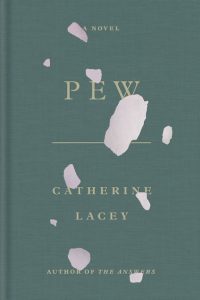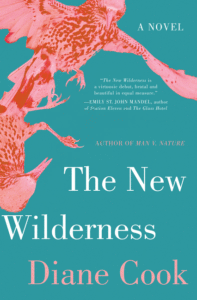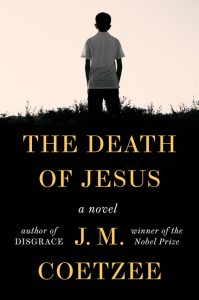
Our quintet of quality reviews this week includes Parul Sehgal on Helen Macdonald’s Vesper Flights, James Wood on Catherine Lacey’s Pew, Emily Temple on Diane Cook’s The New Wilderness, Christian Lorentzen on J. M. Coetzee’s Jesus trilogy, and Katy Waldman on Naoise Dolan’s Exciting Times.
“She could be the twin sister of the Lone Enraptured Male…but instead her work is an antidote to so much romantic, reductive writing about the natural world as pristine, secret, uninhabited—as a convenient blank canvas for the hero’s journey of self-discovery. Macdonald’s writing teems with other voices and perspectives, with her own challenges to herself. It muddies any facile ideas about nature and the human, and prods at how we pleat our prejudices, politics and desires into our notions of the animal world. There’s nothing of the tourist or bystander in her approach … Macdonald experiments with tempo and style, as if testing out different altitudes and finding she can fly at just about any speed, in any direction, with any aim she likes, so supple is her style … I was reminded of the goshawk, so thickly plumed, so powerful that it can bring down a deer, and yet it weighs only a few pounds. These are the very paradoxes of Macdonald’s prose—its lightness and force … For its wry self-deprecation, Vesper Flights is a book thick with sorrow, an elegy in the midst of the sixth great extinction underway.”
–Parul Sehgal on Helen Macdonald’s Vesper Flights (The New York Times)

“… a brave book, in both concept and execution. These days, few writers would venture a novel structured around an almost mute enigma. Caught in the sombre reductions of the tale, though, I sometimes missed the comedy and verve of Lacey’s earlier writing … Lacey’s tendency to push the hypothetical up against the real, the ghostly up against the grounded, can become, in Pew, a kind of drift through genres … At such moments, one has the sense of Lacey being a little unsure of where to take her book … Perhaps my resistance suggests that I have failed the Pew test? Certainly, this difficult and discomfiting book throws down a challenge to our readerly hospitality: in truth, I didn’t always feel inclined to take in this smudged blank of a character, to give Lacey’s cipherlike creation lodgings in the house of empathy … One shouldn’t be surprised, amid such a searching experiment, if the novel form struggles to accommodate a deliberate affront to what novels do uniquely well: the human.”
–James Wood on Catherine Lacey’s Pew (The New Yorker)

“Cook has deepened and expanded on the concerns first aired in her stories, like a fresh mountain stream running inevitably into a deep, cold lake … It’s hard to read all this during a pandemic of a respiratory illness caused by an airborne virus without feeling an extra chill, but Cook has always excelled at rendering horror plainly, whether that horror is monstrous or merely human. Here, we get both: This manages to be a speculative novel about the future and a well-researched tale about living primitively, arrowheads, hides and all … funny too, mordantly so … Cook is a skilled unpeeler of information; revelations and discoveries are timed to perfection. Any time we begin to get complacent in the Wilderness State, Cook remakes the universe, shifting the point of view, the time frame, the physical landscape or the emotional one. It makes a story that might have languished in the valley with its characters move at a brisk pace … That pace flags only occasionally, usually during descriptions of the landscape, which are frequent enough to become slightly tedious. But in a novel about how humans might survive when stripped of a modernity that’s gone too far, maybe that’s part of the point: Even the most beautiful sunsets and sage fields become boring when they’re all you have … More than timely, it feels timeless, solid, like a forgotten classic recently resurfaced—a brutal, beguiling fairy tale about humanity.”
–Emily Temple on Diane Cook’s The New Wilderness (The Washington Post)

“The novels of J. M. Coetzee’s Jesus trilogy take place in a purer world than our own and, on the surface, a simpler one. In this world, which might be an afterlife or a waystation in the transmigration of souls, no one, except newborns, is native, and everyone speaks the same language…The world Coetzee has constructed bears resemblance to his prose style. ‘I do believe in spareness,’ he once remarked. ‘Spare prose and a spare, thrifty world: it’s an unattractive part of my makeup that has exasperated people who have had to share their lives with me.’ It’s hard not to conclude that he has imagined a world in the shape of his own mind … If the setting of these novels is minimalist and ahistorical, and their action the stuff of melodrama and pulp, their texture is philosophical conversation … To say that the message of these novels is something about the limits of human understanding, or that they dramatize the conflict between two different ways of seeing and being in the world, broadly represented by passion and reason—and that the contest comes to a draw—may be unsatisfying, but only if you are expecting to find a pat message. What the reader will remember will be the pleasures available to anyone: the deadpan humor, the swoons of their melodramatic thriller plots, and the beguiling weirdness of the world Coetzee has constructed.”
–Christian Lorentzen on J. M. Coetzee’s Jesus trilogy (Harper’s)
“Rooney and Dolan, who study the intersection of innocence, experience, and self-delusion, are working in the Bildungsroman tradition, which is where the reflexivity trap most often finds its prey. This makes some sense. The Bildungsroman, or coming-of-age story, and its cousin the Künstlerroman, or becoming-an-artist story, are journeys of the self. Historically, these journeys have involved growth (Candide tempers his optimism, Emma her entitlement) and the painful reconciliation of action and belief. But today’s practitioners—Rooney and Dolan, and also Ben Lerner, Sheila Heti, and Kate Zambreno, among others—halt the journey midway through, leaving their characters tuned to problems but unable to solve them. The self-scrutiny and self-recrimination remain; the maturity is optional … This sort of fiction plucks a character from obscurity and showers her in positive reinforcement. The role of the trap, which severs the interior world from exterior events, is to insist that an alluring, intelligent, and popular person remains, despite everything, deeply self-loathing. The reader, meanwhile, begins to wonder whether self-inflicted misery is a sufficient counterweight, narratively, to stupid amounts of adoration … What does it mean to write a coming-of-age novel when a character’s life is predestined? These books, so reluctant to engage with change, agency, and suffering, turn instead to awareness, which they frame as atonement. Meanwhile, the actual substance of living—a person’s history, hopes, and contradictions—is rendered as fixed, external, and inert.”
–Katy Waldman on Naoise Dolan’s Exciting Times (The New Yorker)

